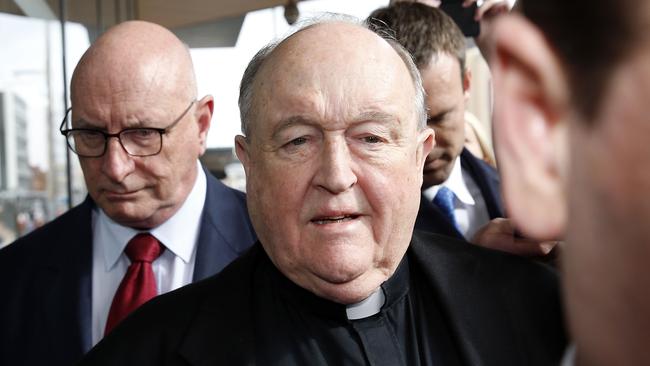For the lynch mob, priests are guilty until proven innocent
As Cardinal Pell waits in jail for his appeal, you have to ask if there is a different burden of proof when it comes to the Catholic Church, writes Miranda Devine.
Rendezview
Don't miss out on the headlines from Rendezview. Followed categories will be added to My News.
It didn’t get much publicity but on Friday the Victorian Court of Appeal quietly acquitted a priest who has spent a year in jail after a jury convicted him of raping a young boy half a century ago.
We seem to be making a habit of this and the world is watching. Defrocked Christian brother John Tyrrell, 80, was ordered to be released from jail immediately. After devoting 62 years of his life to a blameless career of teaching and sacrifice, his innocence was restored. But no one much cares.
In their decision, Justices Stephen Kaye, Richard Niall and Mark Weinberg found “serious discrepancies between [the alleged victim’s] version of events and the facts that were objectively established by the evidence.”
As is the case with Cardinal George Pell, the jury convicted Tyrrell on the uncorroborated allegation of a sole complainant.
MORE FROM MIRANDA DEVINE: How Pell became the Vatican’s sacrificial lamb
Similarly, it was only three months ago that Archbishop Philip Wilson quietly was acquitted after wrongly being convicted of covering up for a paedophile priest 40 years earlier. He also was convicted on the uncorroborated word of one man.

Is this the new burden of proof? Catholic priests are guilty until proven innocent? Sole complainants are always to be believed?
Even the most ardent Catholic-hater must see where this leads.
Judge Roy Ellis, when acquitting Wilson in the Newcastle District Court, described him as a “very honest and forthright” witness who did not attempt to blacken the name of his accuser.
He warned that suspicion was not a substitute for proof and declared that Wilson must not be convicted on the “direction of public opinion”.
MORE FROM MIRANDA DEVINE: Juries can — and do — get it wrong
“In practice, complying with the legal principles may well result in a verdict that is perhaps inconsistent with media or community expectation… But if the verdict is a true representation of justice… then it is community or media expectations that must be dashed, not the hopes of an individual that he or she will receive a fair trial.”
Which brings us to last week’s surreal televised sentencing of Cardinal Pell after his conviction by a jury in December of orally raping two altar boys in 1996 in St Patrick’s Cathedral.
The jury believed the uncorroborated evidence of a single accuser against the denials of Pell and witnesses.
In handing down a six-year sentence, Victoria County Court Chief Judge Peter Kidd acknowledged the atmosphere of hatred against Pell that has consumed Victoria for more than two decades: “in some sections of the community you are a publicly vilified figure…
“We have witnessed, outside of this court and within our community, examples of a ‘witch-hunt’ or ‘lynch mob’ mentality in relation to Cardinal Pell. I utterly condemn such behaviour. That has nothing to do with justice or a civilised society. The courts stand as a bulwark against such irresponsible behaviour.”

Let’s hope he is right, because the Australian legal system is in the dock.
It starts with Victoria Police. In 2015, at the height of a violent crime wave in which parts of Melbourne resembled Johannesburg with routine home invasions and carjackings, somehow the Victoria police had time for a massive investigation into Pell without a single complaint.
MORE FROM MIRANDA DEVINE: Politically correct and risk averse Victoria Police ensure crime thrives
This is an abnormal and discredited method of police investigation known as “trawling”, in which police start with a suspect and work backwards to find a complaint. Over two years, the trawling led to a single uncorroborated allegation which, after failing to convince one jury, eventually led to Pell’s conviction by a second jury last year.
The allegation initially was rejected by the Victorian Office of Public Prosecutions which ultimately handballed the decision about whether to press charges to Victoria Police and commissioner Graham Ashton.
MORE FROM MIRANDA DEVINE: Victoria Police, you are not political activists. Just do your job
There was a long history of enmity between Pell and Ashton. Two years before Ashton became commissioner, he was humiliated by Pell’s team at a 2013 Victorian parliamentary inquiry into The Handling of Child Abuse by Religious and Other Organisations.

As I have written before, Ashton told the inquiry police had not “had a single referral of a child sexual abuse allegation by the Catholic Church’’.
The evidence before the inquiry disputed this claim.
Shortly after becoming Archbishop in 1996, Pell set up the Melbourne Response to handle child sexual abuse allegations against clergy.
Peter O’Callaghan QC, the first independent Commissioner appointed to assess complaints, testified that, of 304 complaints, he had reported 97 to Victoria police and encouraged 76 victims to go to police.
So pleased were Victoria Police at Pell’s initiative in 1996 that, under Ashton’s predecessor, they issued a press release praising the Melbourne Response, and NSW police royal commissioner Justice James Wood also lauded the Catholic Church’s response as a “model” for other institutions.
In June, Cardinal Pell’s appeal will be heard.
But if the experience of Tyrrell is anything to go on, even if he is acquitted, it will make no difference to the lynch mob. Catholic priests are fair game today. Who will it be tomorrow?
Originally published as For the lynch mob, priests are guilty until proven innocent


